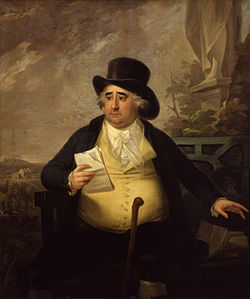Charles James Fox
|
The Right Honourable Charles James Fox |
|
|---|---|
 |
|
| Constituency | Midhurst, West Sussex |
| Secretary of State for Foreign Affairs | |
|
In office 7 February 1806 – 13 September 1806 |
|
| Prime Minister | William Grenville |
| Preceded by | The Lord Mulgrave |
| Succeeded by | Viscount Howick |
|
In office 2 April 1783 – 19 December 1783 |
|
| Prime Minister | The Duke of Portland |
| Preceded by | The Lord Grantham |
| Succeeded by | The Earl Temple |
|
In office 27 March 1782 – 5 July 1782 |
|
| Prime Minister | The Marquess of Rockingham |
| Preceded by | The Viscount Stormont (Northern Secretary) |
| Succeeded by | The Lord Grantham |
| Leader of the House of Commons | |
|
In office 27 March 1782 – 5 July 1782 |
|
| Prime Minister | The Marquess of Rockingham |
| Preceded by | Lord North |
| Succeeded by | Thomas Townshend |
| Personal details | |
| Born |
24 January 1749 Westminster, England |
| Died | 13 September 1806 (aged 57) Chiswick, England |
| Political party | Whig (Foxite) |
| Spouse(s) | Elizabeth Armistead |
| Education | Eton College |
| Alma mater | Hertford College, Oxford |
| Profession | , abolitionist |
Charles James Fox PC (24 January 1749 – 13 September 1806), styled The Honourable from 1762, was a prominent British Whig statesman whose parliamentary career spanned 38 years of the late 18th and early 19th centuries and who was the arch-rival of William Pitt the Younger. His father Henry, a leading Whig of his day, had similarly been the great rival of Pitt's famous father. He rose to prominence in the House of Commons as a forceful and eloquent speaker with a notorious and colourful private life, though his opinions were rather conservative and conventional. However, with the coming of the American War of Independence and the influence of the Whig Edmund Burke, Fox's opinions evolved into some of the most radical ever to be aired in the Parliament of his era.
Fox became a prominent and staunch opponent of George III, whom he regarded as an aspiring tyrant; he supported the American Patriots, even dressing in the colours of George Washington's army. Briefly serving as Britain's first Foreign Secretary in the ministry of the Marquess of Rockingham in 1782, he returned to the post in a coalition government with his old enemy Lord North in 1783. However, the King forced Fox and North out of government before the end of the year, replacing them with the twenty-four-year-old Pitt the Younger, and Fox spent the following twenty-two years facing Pitt and the government benches from across the Commons.
...
Wikipedia
